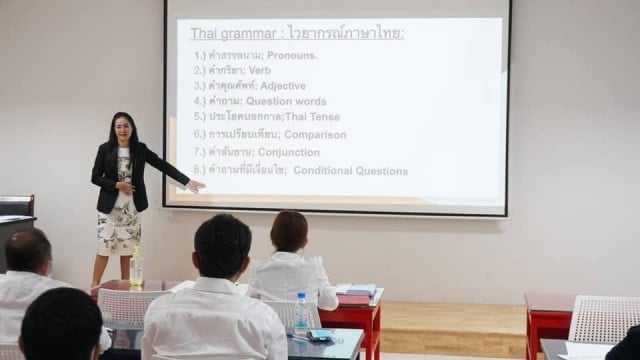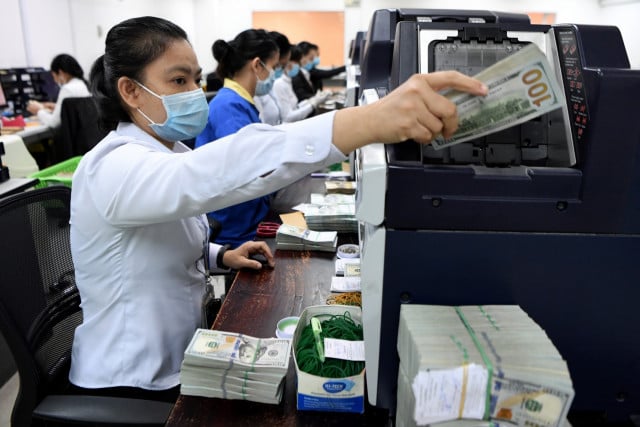Learning Thai to Increase One’s Career Opportunities in Cambodia and ASEAN

- By Ky Chamna
- June 13, 2021 3:32 PM
As students and teachers explain, speaking a foreign language of the region in addition to English may give a person a definite advantage on the job market
PHNOM PENH--With the increasing pace of globalization across a multitude of sectors, many nations around the globe have for a long time used English as the main language in domestic as well as transnational communication. Since the 2000s, Cambodia has integrated into the regional and global community through organizations such as ASEAN as well as the World Trade Organization.
This integration is reflected in the education sector as many Cambodian students are taking the opportunity to study and get involved in international education programs while a number of people in the business sector operate on a regional basis and foreign firms have been investing into the Cambodian market. Because of these changes, English and Chinese have become two of the most popular foreign languages studied by Cambodian students.
As regional integration is encouraged by policymakers, people in general also have wanted to learn languages spoken in ASEAN countries. Thailand, which shares a border with Cambodia and whose language structure and culture have a great deal in common with that of Cambodia, is an important market for trade due to its proximity. That country also represents a large pool of opportunities for young Cambodians. As a result, Thai language has gained in popularity in some universities in the country where it is now offered as an optional course for students.

According to Naschupa Phongpichanon, a Thai-language instructor who has been working since 2017 at Paragon International University in Phnom Penh, Cambodian students quickly grasp the foundational notions of Thai. This, she believes, is due to two reasons.
“First, the common South Indian origin of both Thai and Khmer languages to be found in Sanskrit and Pali, which facilitates the early adoption of elements of vocabulary, which are common to both languages, as well as some similarities in terms of sentence structure,” she explained.
The second reason may be the historical expansion of the Angkorian Empire, which covered areas of today’s Thai territory. The legacy of this empire can still be felt architecturally, religiously as well as in culinary elements and linguistically with, for instance, the Royal Thai language deriving directly from Khmer,” Phongpichanon said.
Given that it might be easy for Cambodians to learn Thai, there still are some important challenges, such as the use of tones in Thai, which is mostly absent in Khmer language and can considerably slow down their learning process and requires particular dedication, she said.
According to the Royal Embassy of Cambodia in Thailand, between 2019 and early February 2021, there were 855 Cambodians enrolled in universities in Thailand and pursuing undergraduate, master’s and doctorate degrees.
Song Daphea is an undergraduate student at Paragon International University (PIU) where he has been studying Thai for about one year. As she explained, she chose to study Thai more because of that country’s songs.
“Thai music is also beautiful,” Daphea said. “I would love to sing their songs and understand the artists’ message.” Moreover, she said, learning a second language is beneficial both in terms of career and personal development. “It is an additional interpersonal skill that one can acquire,” she said.
Liv Liming, who is a junior student majoring of International Relations at PIU, said that he chose to study Thai as he regards Thailand as a rich society in terms of history, trade and education.
“The Thai language is also considered to be the brother language of the Khmer language,” Liming said. People who know basic Khmer have the advantage of being able to learn Thai easily, Livming explained, adding that he sees great potential for both diplomatic and economic relations between the two countries in the future since they are neighbors.
More opportunities
For Nou Samnang, a university student studying Thai, only speaking English as a second language is no longer sufficient in terms of career in the country.
“English has somewhat become a normal language since everyone is learning it,” he said. “However, if you know another language besides English, then that would be special. Knowing numerous languages is better when it comes to finding jobs on the market.”
As a Thai language instructor, Phongpichanon agreed that speaking Thai can give a young Cambodian professional a decisive advantage that may prove a determinant factor in many sectors, from diplomacy to trade and service industries such as tourism.
“Cambodia features a very young yet small demographics, which means that young generations must be outward looking to maximize their opportunities, gaining useful skills and connections in neighboring societies,” Phongpichanon said.
“Mastery of a foreign language is an open door in this regard and will differentiate those getting stuck in terms of career advancement from those creating outstanding opportunities for themselves,” she added.
In terms of trade relations, according to a report from the Royal Embassy of Cambodia in Thailand, the trade volume between Cambodia and Thailand was around $9.4 billion in 2019 but was affected by the COVID-19 pandemic in 2020.
In addition to business sectors, academic cooperation between the two countries has been at an all-time high, Phongpichanon explained, pointing out that, prior to the pandemic, hundreds of Cambodians were studying in Thai universities on scholarship each year, which gave them access to increased resources and a different university experience.
Spirit of regionalism
Learning languages of countries in the region may indicate a rising spirit of regionalism, which is key to the success of the Southeast Asian region, Phongpichanon said.
“I believe that it is indeed essential for Cambodians to gain fluency in another ASEAN language considering the rapid acceleration of regional integration since 2007, with both the ASEAN Charter and the communities’ Blueprints,” she explained.
However, she pointed out, while it is important to acquire knowledge of a language spoken in the region, mastering it can be an undertaking that requires time and commitment.
This is why one should choose the ASEAN language to learn wisely and strategically, Phongpichanon said, including considering the degree of connectivity one language may have with another so as to generate the possibility of a sort of linguistic domino effect.
“In this perspective for instance, Thai language mastery can be easily transferred into learning Lao, just as Malaysian can be conducive to Indonesian,” she explained.
One must also choose wisely before embarking on the journey of mastering a foreign language and take one’s future plans into consideration as it is a commitment of several years, Phongpichanon said.
She went on to say that she would not encourage people to learn several languages simultaneously as it can be confusing and discouraging. It is better to focus on one language at a time, she said.
“Also, start as soon as possible while you still can, as professional commitments and family life can be quite time-consuming later on in life,” Phongpichanon concluded.















